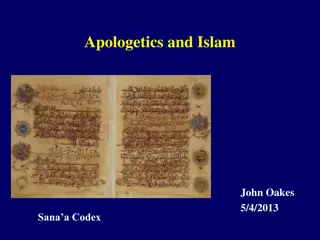Insights on Separation of Spouses in Islam
Explore the guidelines for marital relationships and separation in Islam as per the Quran, emphasizing mutual consent, reconciliation methods, and types of separation. The discussion covers judicial divorce, extra-judicial divorce (Khul and Talaq), and critical terms like Mahr and Nikah. Understanding these aspects is crucial for a better comprehension of marital dynamics in Islamic teachings.
Download Presentation

Please find below an Image/Link to download the presentation.
The content on the website is provided AS IS for your information and personal use only. It may not be sold, licensed, or shared on other websites without obtaining consent from the author.If you encounter any issues during the download, it is possible that the publisher has removed the file from their server.
You are allowed to download the files provided on this website for personal or commercial use, subject to the condition that they are used lawfully. All files are the property of their respective owners.
The content on the website is provided AS IS for your information and personal use only. It may not be sold, licensed, or shared on other websites without obtaining consent from the author.
E N D
Presentation Transcript
Separation of Spouses in Islam Prepared By: Prepared By: Mir, Zayed Abdul Rahman 12B-Atlantis
A Brief Introduction on Marital Relationships 2
According to the Quran, marriage is intended to be unbounded in time, as indicated by its characterization as a "firm bond" and by the rules governing divorce. 3
A relationship between spouses Should be based on love Important Decisions Mutual Consent 4
Marital Disharmony When marital harmony cannot be obtained, the Quran the Quran does allows and even does allows and even advises spouses to advises spouses to bring their marriage to bring their marriage to an end. an end. This is not taken as a light issue and the Quran establishes 2 2 ways ways to avoid hasty divorces. 5
2 methods of Reconciliation: Prescribing two waiting periods of three months before the divorce is final in order to give the husband time to reconsider his decision. A man who takes an oath not to have sexual intercourse with his wife, which would lead to automatic divorce, is allowed a four- month period to break his oath. 6
Types of Separation of Spouses 7
Types of Separation of Spouses In Islam, there are 3 types of Separation which are: Judicial divorce Judicial divorce (formal separation) Extra judicial divorce (divorce by mutual separation) also know as Khul Khul Talaq (dissolution of marriage) Extra judicial divorce Talaq 8
Definition Of Some Terms: Qadi Qadi Islamic Court Judge Mahr - is a nuptial gift made by groom to the bride at the time of marriage. Upon receipt, it becomes her sole property with complete freedom of use and disposal. The marriage contract is not valid without the mahr. The amount of the mahr generally depended on the socio-economic status of the bride. Nikah - The Quran describes nikah a solid contract between two adults. Thus a marriage solemnized before adulthood is not considered a nikah in the Quranic explanation. Mahr Nikah 9
3 types of Separation Judicial Divorce Judicial Divorce Khul Khul Khul is a contractual type of divorce that is initiated by the wife. Talaq Talaq A marriage can also be dissolved by means of judicial divorce. Either spouse can petition a qadi court to obtain judicial divorce, but they must have compelling grounds for dissolving the marriage. In classical Islamic law it refers to the husband's right to dissolve the marriage by simply announcing to his wife that he repudiates her. They did not require the husband to obtain court approval or provide a justification. 10
Judicial Divorce 11
Judicial Divorce The court starts the process by appointing an arbitrator from each of their families in order to seek a mediated reconciliation. If this effort fails, the court adjudicates the dispute by apportioning fault for the breakdown of the marriage with the associated financial consequences. Examples of fault are cruelty; husband's failure to provide maintenance or pay the immediate installment of mahr; infidelity; desertion; moral or social incompatibility; certain ailments; and imprisonment harmful to the marriage. 12
Mutual Divorce (Khul ) 13
Mutual Divorce (Khul) A khul' is concluded when the couple agrees to a divorce in exchange for a monetary compensation paid by the wife, which cannot exceed the value of the mahr she had received, and is generally a smaller sum or involves forfeiting the still unpaid portion The divorce is final and irrevocable, effective when the contract is concluded. He couple cannot reconcile during the waiting period, defined as in the case of talaq, but the husband is required to pay maintenance during its term, unless the requirement is waived by the contract. As in the case of talaq, remarriage is possible until a khul' is concluded for a third time. If the husband pressures his wife to agree to khul' instead of pronouncing talaq, which would let him avoid attendant financial responsibilities, the divorce is considered to be invalid. Like talaq, khul takes place out of court. 14
Talaq (Repudiation) 15
Talaq(Repudiation) In classical Islamic law it refers to the husband's right to dissolve the marriage by simply announcing to his wife that he repudiates her. The jurists imposed certain restrictions on valid repudiation. For example, the declaration must be made in clear terms; the husband must be of sound mind and not coerced. Upon talaq, the wife is entitled to the full payment of mahr if it had not already been paid. The husband is obligated to financially support her until the end of the waiting period or the delivery of her child, if she is pregnant. In addition, she has a right to child support and any past due maintenance, which Islamic law requires to be paid regularly in the course of marriage. Talaq is considered in Islam to be a reprehensible means of divorce. 16
Talaq(Repudiation) The initial declaration of talaq is a revocable repudiation ( al q raj ah) which does not terminate the marriage. The husband can revoke the repudiation at any time during the waiting period ( iddah) which lasts three full menstrual cycles. The waiting period is intended to give the couple an opportunity for reconciliation, and also a means to ensure that the wife is not pregnant. Resumption of sexual relations automatically retracts the repudiation. The wife retains all her rights during the waiting period. The divorce becomes final when the waiting period expires. This is called a "minor" divorce (al-baynuna al-sughra) and the couple can remarry. If the husband repudiates his wife for the third time, it triggers a "major" divorce (al-baynuna al- kubra), after which the couple cannot remarry without an intervening consummated marriage to another man. 17
Wisdom of Separation of Spouses 18
A Hadeethabout Shaytanand Separation of Spouses: Jabir (R.A) reported: The Messenger of Allah, peace and blessings be upon him, said, Verily, Satan Satan places his throne over the water and he places his throne over the water and he sends out his troops. The closest sends out his troops. The closest to him in rank are the greatest at causing tribulations. One of are the greatest at causing tribulations. One of them says: I have done this and this. them says: I have done this and this. Satan Satan says: You have done nothing. Another says: You have done nothing. Another one says: I did not leave this man alone one says: I did not leave this man alone until I separated separated him from his wife. Satan embraces him from his wife. Satan embraces him and he him and he says: You have done well. says: You have done well. Verily, to him in rank until I 19
The Qurans Wisdom about Spouses The Quran uses the word nikah for this union of a man and a woman. It literally means getting absorbed in each other the way rain water absorbs in earth. Hence the Quran describes husband and wife each other s Zauj (equal partner). 20
The Qurans Wisdom about Spouses Both are essential for each other in family union as each complements the other in a manner that without the one the other cannot consider himself or herself complete. It is obvious that in the absence of compatibility, the family life will be not be balanced and healthy. 21
The Qurans Wisdom about Spouses Based from Surah an absolute free choice to both men and women to select their life partner. On one hand, it tells men then marry from among women such as are lawful or desirous to you (4:3), while on the other it tells women that men cannot hold them against their will, O you who have attained to faith! It is not lawful for you to [try to] become heirs to your wives [by holding onto them] against their will Surah an Nisa Nisa: The Quran gives 22
Marital conflicts and their solutions 23
Spousal Clashes and their Solutions In regards to handling conflict we first need to stop focusing on our spouse and start focusing more on ourselves. Even when our spouse is doing something we believe is blameworthy, we still first focus on our own reactions as a means to rectifying the situation. This is because even though we believe our spouse is doing something wrong, we ve usually been enabling and even encouraging their behavior without realizing it. When it comes to conflict, the only person who we can change is ourselves, so the first step in handling marital conflict is to change our own part in a destructive behavior pattern. 24
Spousal Clashes and their Solutions The next thing we have to do is look at our efforts to communicate with our spouse about a problem. This involves broaching the subject and telling our spouse how their behavior is affecting us. This involves being calm, honest, and tactful with our spouse when we speak to them. It calls upon us to eliminate any emotional games, vengeful arguments, hurtful language, or passive-aggressive behavior. In other words, if we want conflict to refine our relationship and make our bond stronger, we have to let go of any spiteful attempts to punish our spouse or vent our anger at them. 25
Spousal Clashes and their Solutions After authentically representing ourselves to our spouse, we have to calmly receive whatever they have to say to us. This may be an emotional tirade that seeks to pull us into a familiar argument, or it may be a valid criticism. In any event, we have to hold on to our resolve to stay calm and respectful, despite how our spouse behaves, and be open to whatever it is they have to say. Our spouse may not agree with us or be willing to change (yet), but at the very least we ve given them food for thought and set a better tone in our marriage. 26
MARITAL DISCORD (An Nushuz) IN ISLAM Part of the Wife Part of the Wife From all the different definitions, we see that Nushuz on the part of the wife revolves around any of four characteristics: 1. She does not beautify herself for her husband when he desires that from her. 2. She disobeys her husband with respect to coming to his bed and she refuses to respond to his calls. 3. She leaves the house without his permission or without any legal right to do so. 4. She does not perform her obligatory religious duties, such as failure to perform some prayers, fasting Ramadan, covering her 'awra, or any other obligatory act of Islam. 27
MARITAL DISCORD (An Nushuz) IN ISLAM Part of the Husband Part of the Husband Nushuz when it is committed by the husband, revolves around the following point: 1. The husband wrongfully elevating and raising himself arrogantly above his wife and above the obligations which Allah has placed upon him with regard to her. 2. He transgresses against her by beating her, harming her, reviling her, abusing her and not treating her properly. 3. He fails to fulfill his mandatory obligations toward her such as support, etc. 4. He becomes diffident toward her and unconcerned for her by boycotting her in talk or in the bed, refusing to speak to her, etc. 28
MARITAL DISCORD (An Nushuz) IN ISLAM The Remedy for The Remedy for Nushuz 1. When a wife is in a state of nushuz, the husband can address it with the following three steps: 2. Admonition and guidance. 3. Boycotting 4. Striking her The Remedy When The Remedy When Nushuz Nushuz is By the Husband is By the Husband 1. Try to discover the reason for his estrangement and/or bad behavior. 2. Admonish her husband and remind him of his responsibility in front of Allah towards his wife such as good behavior and kind treatment. 3. Try to please her husband in order to make things right. This can be just by showing kindness and concern and can also include compromising some of her own rights for the sake of harmony. Nushuz When it is From the Wife When it is From the Wife 29
Lets review some concepts Judicial Divorce Judicial Divorce Either spouse can petition a qadi court to obtain judicial divorce, but they must have compelling grounds for dissolving the marriage. Khul Khul Khul is a contractual type of divorce that is initiated by the wife. Talaq Talaq In classical Islamic law it refers to the husband's right to dissolve the marriage by simply announcing to his wife that he repudiates her. An An Nushuz Nushuz The root of the word nushuz (n-sh-z) refers to something that rises. Traditional Qur'an commentators generally understand women's nushuz as disobedience or rebelliousness (isyan) toward their husbands. 30
Thanks! Any questions? 31























